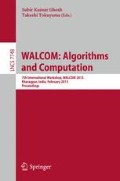Abstract
We consider protocols to transform a self-stabilizing algorithm for one daemon to one that can run under a different daemon. In the literature, there are several daemons, and several possible attributes of those daemons, and it is customary to detail the choice of daemon one is using in designing a specific self-stabilizing algorithm. The choice of daemon plays an important role in designing self-stabilizing algorithm in terms of correctness and convergence time analysis; techniques and complexity vary widely with the type of daemons used. In order to simplify algorithm development in a systematic way, it would be useful to have to consider only one “canonical” daemon and then to use a relatively mechanical procedure to convert the algorithm to any other daemon when needed. We give the first (full) proof that, provided there are IDs, any algorithm that self-stabilizes only under a fair central daemon can be converted to one that self-stabilizes under an unfair read/write daemon.
Access this chapter
Tax calculation will be finalised at checkout
Purchases are for personal use only
Preview
Unable to display preview. Download preview PDF.
References
Dijkstra, E.W.: Self stabilizing systems in spite of distributed control. Comm. ACM 17, 643–644 (1974)
Herman, T.: Models of Self-Stabilization and Sensor Networks. In: Das, S.R., Das, S.K. (eds.) IWDC 2003. LNCS, vol. 2918, pp. 205–214. Springer, Heidelberg (2003)
Dubois, S., Tixeuil, S.: A taxonomy of daemons in self-stabilization. CoRR, abs/1110.0334 (2011)
Korman, A., Kutten, S., Masuzawa, T.: Fast and compact self stabilizing verification, computation, and fault detection of an mst. In: Proceedings of the 30th Annual ACM SIGACT-SIGOPS Symposium on Principles of Distributed Computing, PODC 2011, pp. 311–320. ACM, New York (2011)
Beauquier, J., Delaët, S., Haddad, S.: A 1-Strong Self-stabilizing Transformer. In: Datta, A.K., Gradinariu, M. (eds.) SSS 2006. LNCS, vol. 4280, pp. 95–109. Springer, Heidelberg (2006)
Dolev, S.: Self-Stabilization. MIT Press (2000)
Tel, G.: Introduction to Distributed Algorithms. Cambridge University Press (1994)
Dolev, S., Israeli, A., Moran, S.: Self-stabilization of dynamic systems assuming only read/write atomicity. Distrib. Comput. 7, 3–16 (1993)
Israeli, A., Jalfon, M.: Uniform self-stabilizing ring orientation. Inform. Comput. 104, 175–196 (1993)
Dolev, S., Gouda, M.G., Schneider, M.: Memory requirements for silent stabilization. In: PODC 1996 Proceedings of the Fifteenth Annual ACM Symposium on Principles of Distributed Computing, pp. 27–34 (1996)
Itkis, G., Lin, C., Simon, J.: Deterministic, Constant Space, Self-Stabilizing Leader Election on Uniform Rings. In: Helary, J.-M., Raynal, M. (eds.) WDAG 1995. LNCS, vol. 972, pp. 288–302. Springer, Heidelberg (1995)
Gradinariu, M., Johnen, C.: Self-stabilizing Neighborhood Unique Naming under Unfair Scheduler. In: Sakellariou, R., Keane, J.A., Gurd, J.R., Freeman, L. (eds.) Euro-Par 2001. LNCS, vol. 2150, pp. 458–465. Springer, Heidelberg (2001)
Goddard, W., Hedetniemi, S.T., Jacobs, D.P., Srimani, P.K.: Anonymous Daemon Conversion in Self-stabilizing Algorithms by Randomization in Constant Space. In: Rao, S., Chatterjee, M., Jayanti, P., Murthy, C.S.R., Saha, S.K. (eds.) ICDCN 2008. LNCS, vol. 4904, pp. 182–190. Springer, Heidelberg (2008)
Beauquier, J., Datta, A.K., Gradinariu, M., Magniette, F.: Self-Stabilizing Local Mutual Exclusion and Daemon Refinement. In: Herlihy, M.P. (ed.) DISC 2000. LNCS, vol. 1914, pp. 223–237. Springer, Heidelberg (2000)
Hsu, S.C., Huang, S.T.: A self-stabilizing algorithm for maximal matching. Inform. Process. Lett. 43, 77–81 (1992)
Beauquier, J., Gradinariu, M., Johnen, C.: Cross-Over Composition - Enforcement of Fairness under Unfair Adversary. In: Datta, A.K., Herman, T. (eds.) WSS 2001. LNCS, vol. 2194, pp. 19–34. Springer, Heidelberg (2001)
Lamport, L.: A new solution of Dijkstra’s concurrent programming problem. Communications of the ACM 17, 453–455 (1974)
Awerbuch, B., Kutten, S., Mansour, Y., Patt-Shamir, B., Varghese, G.: Time optimal self-stabilizing synchronization. In: STOC 1993 Proceedings of the 25th Annual ACM Symposium on Theory of Computing, pp. 652–661 (1993)
Karaata, M.H.: Self-stabilizing strong fairness under weak fairness. IEEE Trans. Parallel Distrib. Systems 12, 337–345 (2001)
Gouda, M.G., Haddix, F.: The alternator. In: Proceedings of the Fourth Workshop on Self-Stabilizing Systems (published in association with ICDCS 1999), pp. 48–53. IEEE Computer Society (1999)
Mizuno, M., Kakugawa, H.: A Timestamp Based Transformation of Self-Stabilizing Programs for Distributed Computing Environments. In: Babaoğlu, Ö., Marzullo, K. (eds.) WDAG 1996. LNCS, vol. 1151, pp. 304–321. Springer, Heidelberg (1996)
Kakugawa, H., Mizuno, M., Nesterenko, M.: Development of self-stabilizing distributed algorithms using transformation: case studies. In: Proceedings of the Third Workshop on Self-Stabilizing Systems, pp. 16–30. Carleton University Press (1997)
Nesterenko, M., Arora, A.: Stabilization-preserving atomicity refinement. J. Parallel Distrib. Comput. 62(5), 766–791 (2002)
Shukla, S., Rosenkrantz, D., Ravi, S.: Developing self-stabilizing coloring algorithms via systematic randomization. In: Proceedings of the International Workshop on Parallel Processing, pp. 668–673 (1994)
Hoepman, J.H.: Uniform Deterministic Self-Stabilizing Ring-Orientation on Odd-Length Rings. In: Tel, G., Vitányi, P.M.B. (eds.) WDAG 1994. LNCS, vol. 857, pp. 265–279. Springer, Heidelberg (1994)
Angluin, D.: Global and local properties in networks of processors. In: Proc. 12th Symposium on the Theory of Computing, pp. 82–93 (1980)
Author information
Authors and Affiliations
Editor information
Editors and Affiliations
Rights and permissions
Copyright information
© 2013 Springer-Verlag Berlin Heidelberg
About this paper
Cite this paper
Goddard, W., Srimani, P.K. (2013). Daemon Conversions in Distributed Self-stabilizing Algorithms. In: Ghosh, S.K., Tokuyama, T. (eds) WALCOM: Algorithms and Computation. WALCOM 2013. Lecture Notes in Computer Science, vol 7748. Springer, Berlin, Heidelberg. https://doi.org/10.1007/978-3-642-36065-7_15
Download citation
DOI: https://doi.org/10.1007/978-3-642-36065-7_15
Publisher Name: Springer, Berlin, Heidelberg
Print ISBN: 978-3-642-36064-0
Online ISBN: 978-3-642-36065-7
eBook Packages: Computer ScienceComputer Science (R0)

